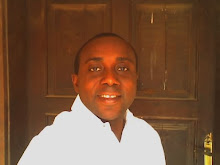Monday, April 22, 2013
Dying for polio is nothing
Despite the chaotic nature of the obnoxious checkpoints, at repetitive and rapid intervals within the commercial city, with all the stories about a state on the verge of civil armed conflict with mysterious insurgents, whom nobody could really and truly pinpoint. Kano is quite a calm and sleepy place, where violence is a misnomer apart from the type deeply rooted in sociologically deviant behavior, easily associated with densely populated environments, which have high concentration of unemployment, habitual usage of illicit of drugs and challenges of the insufficiency of requisite skills for production. As somebody who has to pass by the Africa House every day, which is the official title for the government house, nothing mystifies the soul and gladdens the sight than the leisurely pace and atmosphere, exhibited by those it is for whom the duty to guard the place. Indeed, you hardly find guns drawn at passersby except when there is a special guest in town, which was exactly what happened last Friday the 8th of February 2013.
Most citizens of the city apart from the few that were media savvy, did not know of the planned visit of the Minister of Police affairs with the Inspector General of the Police on that very day, which was a tour to examine the progress of work at the Nigerian Police College, Wudil. Thus, the sight of a battle ready combat fatigued troops on the streets, seemed adequately reassuring for any eventuality of a security breach, which has become the situational norm for a city searching for its soul. Unfortunately, the news that filtered from various media outlets around middle afternoon is the story of an evident massacre of health workers, serving under the Polio Immunization Program of the federal government, who were callously and cowardly shot by some individuals while reporting for duty.
Indeed, the grand irony for the Nigerian police is the fact of the presence of big masquerade or when strategic areas of the municipality are swarmed with security personnel, could still not prevent the premeditated attack on a soft target of unarmed women, presenting a clear picture of the security challenges bedeviling the polity, which by far outweighs peripheral initiatives of intimidating a determined opponent with the parade of armory.
Unfortunately, it is the façade of a political battle which the somber global fight for the eradication of polio has assumed in Kano, which is not merely within the class of ill informed peasants that do not know better, rather it is inclusive of professionals in the fields of pharmacy and medicine pondering on why is it only polio, which has seemed to galvanize the international community into action, when other communicable disease abound within a poverty stricken society struggling with issues of clean and healthy environment.
In fact, unlike before when the argument about the composition of the contents of the vaccines is among ordinary folks, whom the influence of temporal and spiritual authorities could be easily brought-in to bear, the epochal 2003 governorship election in the state elevated the suspicion on the global inoculation drive into an administrative problem, when a government basking on the euphoria of winning a mandate from the masses, a fact distinctly abnormal in a nation notoriously known for rigged and fraudulent elections, sought to lead from the back rather than the front, which was about allowing the people to set the agenda, that seemed to have backfired with Ibrahim Shekarau’s shenanigans of investigating the authenticity of polio vaccines medicinal roots.
As a society highly unapologetic and exceptionally proud about its links with religion or more precisely Islam, clerics are very important figures in the hierarchical order of power, influence and loyalty of the people and play an important role in the dissemination of information from the government to the people. However, to enjoy and attain such revered status of interceding on behalf of the authorities, a scholar must develop a fiery resolve of opposing anything coming from the western world, even if it is through mediums of European enterprise such as radio and television, which has brought them fame, supporters and power.
A fact which perfectly describes a cleric, who is known within and without the vicinity of the city, whose silence at this very moment of deep communal tragedy desires an explanation, as the ultimate authority on polio, not through an international recognized peer reviewed research on the probable causes and cures for the ailment or even a proven discovery of a premeditated plot to contaminate the vaccines for ulterior motives but on the strength of an internet inspired newfangled theories, about the complicity of some extraneous forces to the conspiracy to sterilize the population. Indeed, unlike most other clerics whom ignorance could be easily leveled against their opposition to polio vaccination, Dr. Datti Ahmed could seemingly argue from the enlightened pedestal of deep knowledge in virology, as an honor graduate of the University of Ibadan, a former presidential aspirant in the government funded Social Democratic Party and an acclaimed friend of former President Olusegun Obasanjo, thus could certainly not be associated with the perfidy of shouting without a cause.
Subscribe to:
Post Comments (Atom)

No comments:
Post a Comment